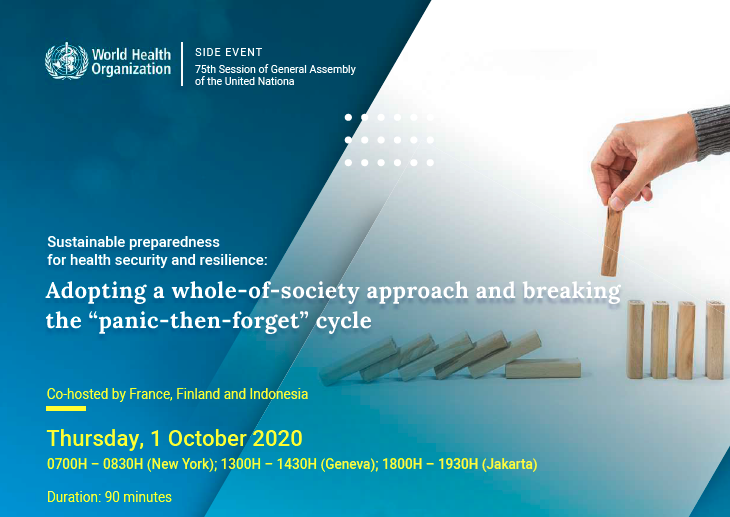
UNGA | Side Event - Sustainable preparedness for health security and resilience: Adopting a whole-of-society approach and breaking the “panic-then-forget” cycle
September 29, 2020
Concept Note
The COVID-19 pandemic has highlighted the vulnerability of countries and communities to the risks and impacts of health emergencies and disasters, including disease outbreaks and epidemics. Such crises threaten lives, livelihoods, cause social disorder, disrupt economies, impede sustainable development and threaten foreign relations. Large-scale health emergencies have potentially wide-ranging consequences that transcend national boundaries. Recent health emergencies have also been exacerbated by factors such as poverty and social inequalities, rapid population growth and displacement, increased movement of people, animals and goods, urbanization, climate change, and conflicts.
The pandemic has demonstrated that all countries have struggled to manage an emergency of this speed and scale. Many health threats require actions outside the ability of any single country or organization to address by themselves. An effective response depends on local, multisectoral preparedness and response capacities as well as the coordinated ability of the international community to act.1 As such, global health security and international foreign policy are intrinsically linked. The greater need for coordination at the global level was a driving factor in the adoption of the International Health Regulations (IHR 2005)2.
Unfortunately, COVID-19 will not be the world’s last health emergency. There is an urgent need to ensure that countries continue to recognize the importance of leadership and coordination, strengthen and maintain IHR 2005 core capacities, have effective and resilient health systems, and ensure that all stakeholders across society including the community are engaged to effectively prevent, detect and respond to emergencies, especially severe epidemics and pandemics. Shared global vulnerability demands that in recovery and building better, all countries take actions and invest in ensuring sustainable preparedness and resilience through a whole-of-society approach. Countries also need to increasingly work together to be better prepared. This may be through sharing of resources, expertise and experiences to strengthen each other’s capacities, including building up domestic capacities, especially in urban settings, or ensuring access to capacities in other countries when health emergencies occur.
Member States, UN system organisations and partners are leading multiple initiatives to address some of the immediate challenges, including through the COVID-19 strategic preparedness and response plan3 and the UN framework for the immediate socio-economic response to COVID-19 . Furthermore, World Health Assembly resolution 73.1 on the COVID-194 response called for Member States to sustainably strengthen among others, preparedness, surveillance and response capacities in a whole-of-society manner5. Unfortunately, past crises have also shown that attention and funding for emergency preparedness and response capacities tend to drop off once the acute response phase is over. The world needs to break this “panic-then-forget” cycle once and for all.
It is thus imperative that as a global community, we capture good practices and lessons learnt in countries, explore innovative ways to address challenges and seize opportunities and advances made during the COVID-19 pandemic to build better preparedness against future health threats6.
Key objectives of the session are to:
- Highlight experiences and lessons learnt by countries in emergency preparedness before and during the COVID-19 pandemic;
- Advocate for long-term, sustainable emergency preparedness through diplomacy, investments, capacity building and health system strengthening;
- Advocate applying a whole-of-society approach in countries for sustainable emergency preparedness through effective multisectoral collaboration and community engagement.
Expected outcomes:
- Identification of key needs and challenges in strengthening and sustaining emergency preparedness for health security and resilience during COVID-19 and beyond, including implementation of the IHR 2005;
- Increased dialogue on further strengthening sustainable preparedness by Member States, UN System organisations and partners;
- Identification of clear actions that stakeholders can take in building better from the pandemic through effective multisectoral partnerships and community engagement, to manage health emergencies.
Target audience:
WHO Member States, UN agencies, Partners and Donors interested and involved in public health emergency preparedness and response.
Date / Time:
1st October 2020, Thursday
0700 – 0830H (New York); 1300H – 1430H (Geneva); 1800H – 1930H (Jakarta)
Proceedings: The side meeting will be held on Zoom, with pre-registration of participants. The side-event will be held in English.
Co-Hosts:
WHO and Governments of France, Finland and Indonesia
Moderator:
Vernon Lee; Chair for the Lancet Infectious Diseases Commission on Preparedness for Emerging Epidemic Threats
1. World Health Organization. (2020). Multisectoral preparedness coordination framework: best practices, case studies and key elements of advancing multisectoral coordination for health emergency preparedness and health security. World Health Organization. https://apps.who.int/iris/handle/101005/332220↩
2. World Health Organization. (2008). International Health Regulations (2005) Second Edition. World Health Organization. https://www.who.int/ihr/publications/97892415910064/en/↩
3. World Health Organization. (2020). COVID‑19 strategy update – 14 April 2020. World Health Organization. https://www.who.int/publications/i/item/covid-19-strategy-update---14-a…↩
4. United Nations. (2020). A UN framework for the immediate socio-economic response to COVID-19. United Nations. https://www.un.org/sites/un2.un.org/files/un_framework_report_on_covid-… ↩
5. Seventy-third World Health Assembly. (2020). COVID-19 response. World Health Organization. https://apps.who.int/gb/ebwha/pdf_files/WHA73/A73_R1-en.pdf↩
6. World Health Organization. (2020). Investing in and building longer-term health emergency preparedness during the COVID-19 pandemic. World Health Organization. https://www.who.int/publications/i/item/investing-in-and-building-longe…↩